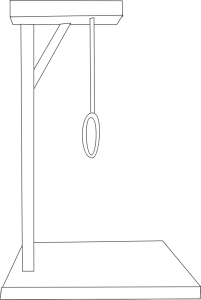French name, common law purpose
It has a funny name.
And a deadly serious nature.
 And just about everybody pronounces it wrong.
And just about everybody pronounces it wrong.
So The Legal Genealogist is on the road today, en route to the Spring Seminar of the Alabama Genealogical Society at Samford University in Birmingham tomorrow (will I see you there?)… but there’s a term that has reader Janet puzzled that we can clear up fairly quickly.
“I found a court record where the guy I think is my ancestor was involved, but I never heard of this court,” she wrote.
Its name: the Court of Oyer and Terminer.
You’ll come across this court in a number of jurisdictions. It was set up in Massachusetts in 1692 (think Salem… think charges of withcraft),1 it existed in New York between 1683 and 1895,2 the name was used for courts in Virginia and Delaware and Pennsylvania and Georgia, and other states as well.3
And it was a court of criminal jurisdiction — usually very serious criminal jurisdiction indeed: “This name is generally used (sometimes, with additions) as the title, or part of the title, of a state court of criminal jurisdiction, or of the criminal branch of a court of general jurisdiction, being commonly applied to such courts as may try felonies, or the higher grades of crime.”4
So, historically, courts of oyer and terminer were superior courts set up to hear criminal cases. Things like treason and serious felonies. Crimes that carried penalties like death or maiming. In many slave-holding states, they were the courts that handled cases against slaves who could face death if convicted.
The name is drawn from legal French — meaning literally to hear and determine.5
But it’s not given the French oh-yay type pronunciatipon. It is, instead, oy-yer and ter-min-er, with the -er pronounced in plain English.
The funny-sounding court with the deadly serious nature.
SOURCES
Image: Open Clip Art
- Court of Oyer and Tewrminer, Glossary, Salem Witch Trials, About.com Women’s History (http://womenshistory.about.com : accessed 3 Apr 2014). ↩
- “Records Relating to Criminal Trials, Appeals, and Pardons ,” New York State Archives information leaflet 9 (http://www.archives.nysed.gov : accessed 3 Apr 2014). ↩
- Wikipedia (http://www.wikipedia.com), “term,” rev. 24 Jan 2014. ↩
- Henry Campbell Black, A Dictionary of Law (St. Paul, Minn. : West, 1891), 292, “court of oyer and terminer.” ↩
- Merriam-Webster Online Dictionary (http://www.m-w.com : accessed 3 Apr 2014), “oyer and terminer.” ↩



Probate records at least in Pennsylvania are found in this name of court, even there’s no criminal activity involved.
Glad I learn something about the meaning of the O and T.
I’m a bit confused as to why probate records would be in this court in Pennsylvania. It was a court established by the Constitution of 1790 as a criminal court only: “The Judges of the Court of Common Pleas, in each county, shall, by virtue of their offices, be Justices of Oyer and Terminer and General Gaol Delivery, for the trial of capital and other offenders therein: Any two of the said Judges, the President being one, shall be a quorum; but they shall not hold a court of Oyer and Terminer or Gaol Delivery in any county, when the Judges of the Supreme Court, or any of them, shall be sitting in the same county. The party accused, as well as the commonwealth, may, under such regulations as shall be prescribed by law, remove the indictment and proceedings, or a transcript thereof, into the Supreme Court.”
What role (if any) did a jury play in Courts of Oyer and Terminer? My recollection is that the original function of the English jury was to advise the judge as to the true facts of the case and the reliability of the testimony he was hearing, based on their own personal first hand knowledge of the events and people involved.
Most jurisdictions required jury trials even before the Constitution for serious offenses and, after the Constitution was adopted, all felony defendants had the right to indictment by grand jury and trial by petit jury.
I ran across these records in Bedford County, Pa this fall over 4 trips. I was chasing an 4x great grandfather who may have been murdered. I looked thru all of the “regular” criminal court records. Went to Harrisburg to look at more records for the County (some records archived there and no longer in Bedford county). I said something to the archivist in Harrisburg that all the crimes I found were “small time” crimes. He located another archivist who came back and informed me I needed the Bedford O&T records (he explained what the collection was) and at inventory conducted in 1987 by the State and Bedford had the records. Back to Bedford where the archivist didn’t even know about existence of Court, let alone records were in her archives. The records we looked at mostly comprised: murder, rape and major financial theft (fraudulent money schemes, theft of land, etc). Didn’t find a murder trial for the guy who “killed my 4x”, so maybe it was an accident not murder. However, I did find the standard penalty in Bedford for rape was 5 years hard labor in jail + $1000 paid to the woman raped, per rapist. In 1830 that was a large sum of money. It was interesting to read the penalties for the crimes and they seemed a lot “fairer” to the victims than today.
Glad to hear that you finally found the records of that court, Sandy — and yes penalties were a lot different in the past. Sometimes the death penalty was attached to things we wouldn’t consider very major today. (Horse theft, for example.)